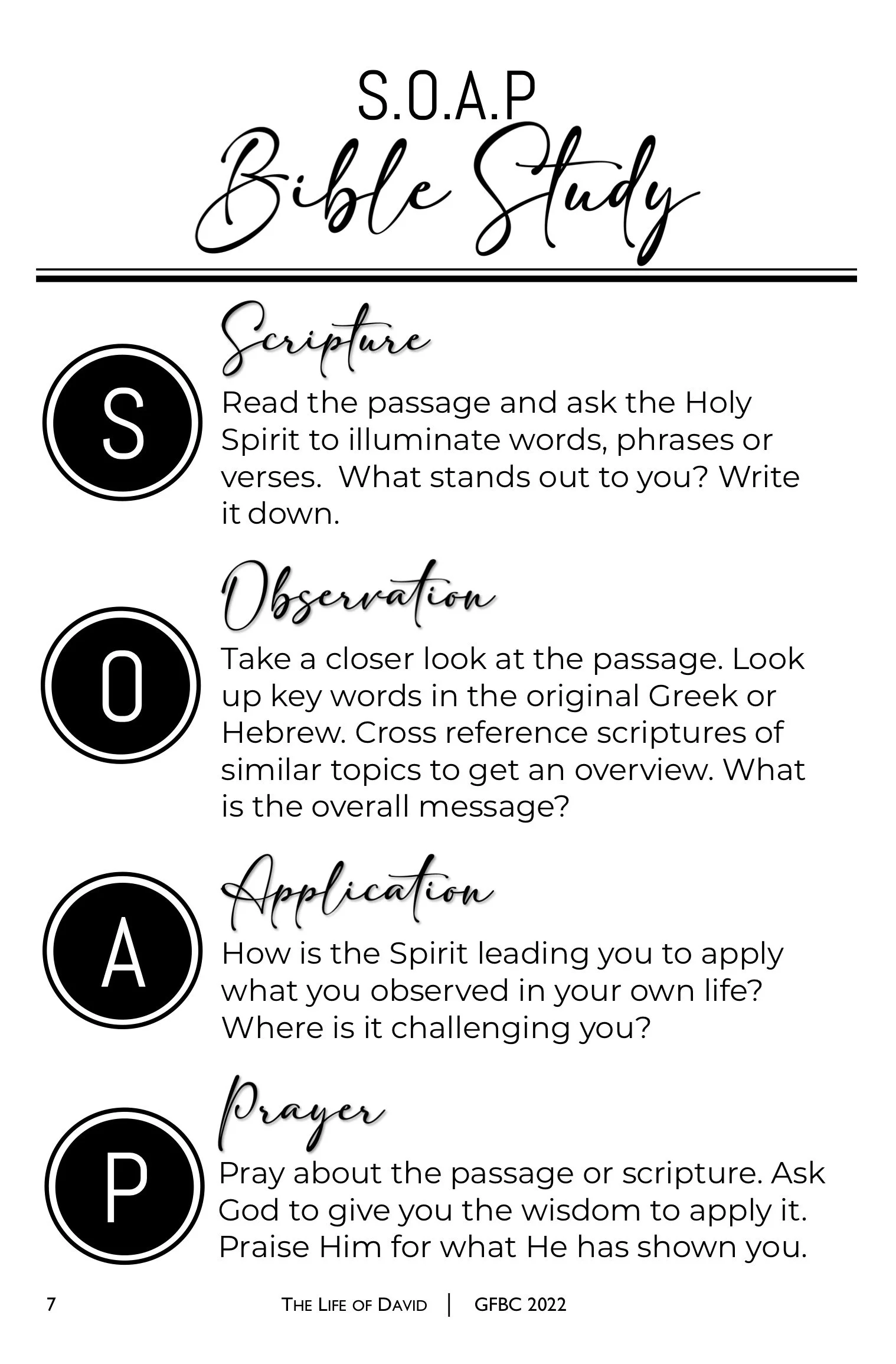-Our Mission
-Introduction from Pastors
-Features of the Journal
-How to Use the S.O.A.P. Method
WEEK 1: I Samuel 1-15, Psalm 47, 93, 97
WEEK 2: I Samuel 16-18, Psalm 23, 103, 145
WEEK 3: I Samuel 19-22, Psalm 34, 52, 57, 59
WEEK 4: I Samuel 23-26, Psalm 46, 54
WEEK 5: I Samuel 27-30, Psalm 1, 37
WEEK 6: I Samuel 31 & 2 Samuel 1-3, Psalm 30, 78, 89
WEEK 7: 2 Samuel 4-7, Psalm 25, 61, 85, 86
WEEK 8: 2 Samuel 8-10, Psalm 25, 61, 85, 86
WEEK 9: 2 Samuel 11-14, Psalm 32, 51
WEEK 10: 2 Samuel 16-19, Psalm 3, 4, 143
WEEK 11: 2 Samuel 20-24; I Chron. 21, Psalm 18
WEEK 12: I Chronicles 22-27, Psalm 2, 22,110,118
WEEK 13: I Chronicles 28-29, Psalm 72, 139
Additional Notes
KIDS’ CORNER
Of all the things for which a Christian could aspire, can there be anything greater than to be called “ a man after God’s own heart?” (Cf. Acts 13:22) Protector of sheep from lion and bear, defender of nation from the “Goliaths” who gallivant in this world, wandering unjustly from cave to cave and king of a nation, nothing befits David more than God’s own ascription for him, “a man after God’s own heart.” But we must ask, what does it take to garner such a description? It is certainly NOT perfection, for David was anything but perfect as detailed by the brutal honesty of Scripture’s explanation of David’s sins.
While not perfect, David knew where his hope was grounded (Psalm 69:6). Focused with few exceptions on obedience to the Lord, David conducted his life on earth trusting God and believing that God’s purposes are best. In addition, throughout his life David demonstrated a humble dependence upon the Lord. Whether waiting for God’s timing to ascend the throne or enjoying God’s blessings while on the throne, David clearly understood who God is as well as his need for God. (1 Samuel 24:4-7).
Furthermore, “the man after God’s own heart” responded with humility and true repentance by agreeing with God when his sin was made evident to him. Obedience, humble dependence and true repentance mark the person who is “after God’s own heart.” Could your heart be described in such a manner?
Our prayer for you as we engage in this study of David would be that you would indeed aspire to pursue God’s heart as David did. Would you be willing to pray and work together with us toward that goal?
In Him,
Pastor Kevin Robinson
Just like you need physical food for physical strength, you need spiritual food for spiritual strength. The Bible describes itself as spiritual food — the water, milk, bread, and meat of our spiritual lives. It’s everything you need to grow in your walk with Christ. And just like we do in life, as we grow, we move on from milk to solid food.
And I, brethren, could not speak to you as to spiritual people but as to carnal, as to babes in Christ. I fed you with milk and not with solid food for until now you were not able to receive it, and even now you are still not able;
1 CORINTHIANS 3:1-2
The word “milk” in the verse above is gala in Greek, and it refers to the basic, elemental teachings of Christianity first learned by new believers according to Vine’s Expository Dictionary of the Old and New Testaments.
The words “solid food” in verse 2 is from the Greek word “broma”. It literally means food or meat, according to Strong’s Exhaustive Concordance of the Bible. (See broma: Strong’s number 1033.) It means the deeper, more complete teachings of God’s Word.
The “Meat for the week” is meant for just that: to give you something to chew on, something to really think through. It will help you go a little deeper in your understanding of God's word. We hope you will take advantage of these things and deepen your understanding of God's word.
Pastor Robbie Edwards
Behold The King
As we study the life of David in this journal, it seems appropriate to accompany each week’s study with a selection of psalms, many of which were written by David himself. These psalms provide additional insight into David’s life and experiences, and they also help reveal the heart of a king who was known as a man after God’s own heart. More importantly, though, the psalms serve the purpose of pointing us to the One True King. Even as the psalmists lament conditions in this life which cause pain and struggle for God’s people, they ultimately lead us to praise the One who is faithful and worthy!
Each week, your reading in 1 and 2 Samuel will be accompanied by a handful of psalms that align either historically or thematically to that particular time in David’s life. Reflection questions will support your study, and all are designed to help you specifically look for the way the psalms teach us about the character and attributes of God. Since the psalms are a compilation of work from several different writers, those that are specifically attributed to David are marked with an asterisk (*).
We hope this additional layer of study is beneficial for you and that ultimately, it helps you behold the King!
What’s in a Week?
Each week of this journal contains several elements to support your personal study. Let’s learn and grow together, learning how to be men and women after God’s own heart!
Weekly Journal Layout
• “Meat for the Week” — Begin each week by taking a closer look at a topic from the passages you’ll be reading that week. Take note of ideas you might want to explore with further study throughout the week.
• Monday through Thursday — focused reading through I & 2 Samuel and I Chronicles. Practice the SOAP method.
• Friday — “Behold the King” gives us an opportunity to read and reflect on the psalms.
• Prayer Requests & Notes — provides a verse from Scripture to memorize and a place to jot down prayer requests throughout the week
• Sermon Notes — sermons throughout the study will follow the pacing of the weekly readings, contributing to our study through 1 & 2 Samuel.
• Kids’ Corner — For families with kids, this section gives you something to use for weekly family devotions so you can study the life of David together.




